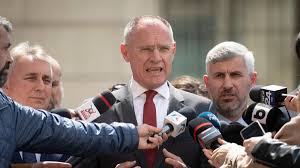Austria may lift veto preventing Romania and Bulgaria joining Schengen

Brussels: Austria’s Interior Minister has hinted that Austria could lift its veto on full Schengen area membership for Romania and Bulgaria after improvements in border protection.
It follows calls from Austria’s designated EU Commissioner for Migration, Magnus Brunner, for both countries to become full members.
For the past two years Austria has been blocking the full admission of Romania and Bulgaria into the Schengen area which guarantees the free movement of people and goods inside the Europe Union.
The argument at the time was that too many refugees were reaching Austria via the Western Balkans route. In the previous year, the rules were then relaxed somewhat and free entry and exit by air and sea was made possible.
The situation has since improved further, according to the Ministry of the Interior.
Speaking at a hearing in the EU parliament, Karner said: “We can now see that the numbers of illegal migration via these countries in particular have fallen massively. This means that we are on the right path, but have not yet reached the end of the road.”
He added that Austria had been able to achieve significant improvements in border protection and returns as a result of the veto, but the aim was to push illegal migration towards zero.
Romania MEP Victor Negrescu recently announced that Romania is on the ‘final stretch’ towards Schengen membership, outlining three possible scenarios: a decision made this year, a longer-term negotiation with the new European Commission and possibly delays as a result of the political situation in Bulgaria.
Romania Prime Minister Marcel Ciolacu meets Italian Premier Giorgia Meloni in Rome.
Romania Prime Minister Marcel Ciolacu meets Italian Premier Giorgia Meloni in Rome.Roberto Monaldo/LaPresse
Meanwhile, Romania’s Prime Minister, Marcel Ciolacu, has said he believes Romania could fully enter the Schengen area by spring 2025, with a decision made before the second round of presidential elections on 8 December.
Ciolacu indicated that the process could be finalised by December, with implementation set to begin in March next year. This change would enable Romanians to cross EU land borders without checks by Easter 2025.
The talks on Schengen enlargement are making “good progress”, as Austria’s designated EU Commissioner for Migration, Magnus Brunner, recently reported at his hearing in the EU Parliament. An agreement therefore seems to be in sight.
The breakthrough could come at a meeting with both countries in Hungary on 22 November.





